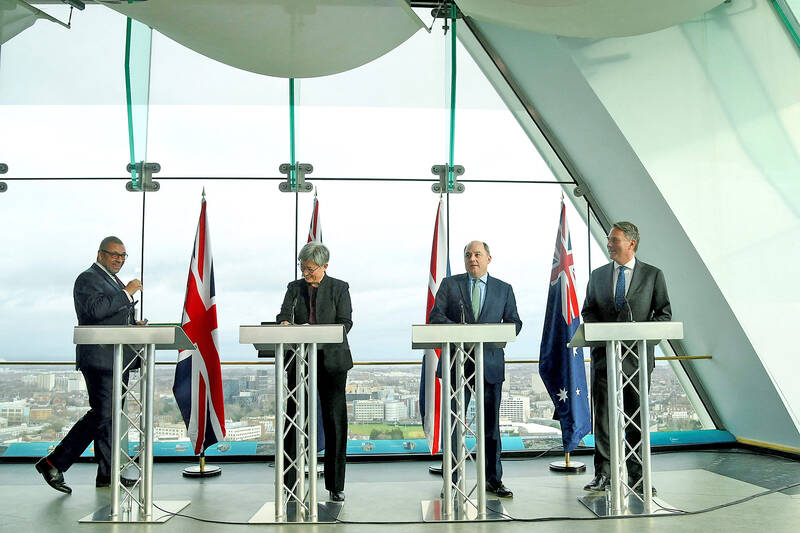The Ministry of Foreign Affairs (MOFA) yesterday thanked the UK and Australia for pledging to deepen relations with Taiwan and for opposing any attempt to unilaterally change the “status quo” in the Taiwan Strait.
London and Canberra made the remarks in a joint statement issued on Thursday at the conclusion of the annual Australia-UK Ministerial Consultations, held this year in Portsmouth, England.
The meeting was attended by British Secretary of State for Foreign, Commonwealth and Development Affairs James Cleverly, British Secretary of State for Defence Ben Wallace, Australian Minister for Foreign Affairs Penny Wong (黃英賢) and Australian Deputy Prime Minister Richard Marles.

Photo: AFP
The two sides said they discussed “the importance of peace and stability across the Taiwan Strait and encouraged the peaceful resolution of cross-strait issues without the threat or use of force or coercion.”
Australia and the UK support Taiwan’s meaningful participation in international organizations, and expressed hopes to deepen relations with Taiwan in the economic, scientific, trade, technological and cultural fields, the statement said.
They plan to work together “to ensure an Indo-Pacific region that is open, stable, prosperous and respectful of sovereignty, human rights and international law,” it said.
The remarks came after similar statements by the US and Japan earlier this month, as well as from France and Australia on Monday.
The comments show that peace and stability in the Taiwan Strait has become the consensus among democratic countries, and a crucial part of maintaining a free and open Indo-Pacific region, MOFA said.
The UK and Australia are like-minded partners to Taiwan, it said, adding that the three governments continue to work closely to safeguard a peaceful international order, and maintain stability and prosperity for the region and the rest of the world.
Separately, Japanese Minister of Foreign Affairs Yoshimasa Hayashi on Thursday spoke on the telephone with Chinese Minister of Foreign Affairs Qin Gang (秦剛) for the first time since Qin took office at the end of last year.
Hayashi during the call talked about the importance of peace and stability in the Taiwan Strait, and voiced grave concern about China’s increased military activity around Japan, NHK reported yesterday.
Qin said that “peaceful coexistence and friendly cooperation are the only correct choice for both sides,” which indicated China’s willingness to improve its relations with Japan, the broadcaster reported.
Qin asked Japan to restrain its actions and comments regarding Taiwan, adding that it should avoid provocative actions around the Diaoyutai Islands (釣魚台), known as the Senkaku Islands in Japan, it said.
Hayashi yesterday said that Qin invited him to visit China during the call, although no date has been arranged.
Hayashi did not say who initiated the call, but said both parties considered the discussion necessary.
Additional reporting by Lin Tsuei-yi

MAKING WAVES: China’s maritime militia could become a nontraditional threat in war, clogging up shipping lanes to prevent US or Japanese intervention, a report said About 1,900 Chinese ships flying flags of convenience and fishing vessels that participated in China’s military exercises around Taiwan last month and in January last year have been listed for monitoring, Coast Guard Administration (CGA) Deputy Director-General Hsieh Ching-chin (謝慶欽) said yesterday. Following amendments to the Commercial Port Act (商港法) and the Law of Ships (船舶法) last month, the CGA can designate possible berthing areas or deny ports of call for vessels suspected of loitering around areas where undersea cables can be accessed, Oceans Affairs Council Minister Kuan Bi-ling (管碧玲) said. The list of suspected ships, originally 300, had risen to about

DAREDEVIL: Honnold said it had always been a dream of his to climb Taipei 101, while a Netflix producer said the skyscraper was ‘a real icon of this country’ US climber Alex Honnold yesterday took on Taiwan’s tallest building, becoming the first person to scale Taipei 101 without a rope, harness or safety net. Hundreds of spectators gathered at the base of the 101-story skyscraper to watch Honnold, 40, embark on his daredevil feat, which was also broadcast live on Netflix. Dressed in a red T-shirt and yellow custom-made climbing shoes, Honnold swiftly moved up the southeast face of the glass and steel building. At one point, he stepped onto a platform midway up to wave down at fans and onlookers who were taking photos. People watching from inside

Japan’s strategic alliance with the US would collapse if Tokyo were to turn away from a conflict in Taiwan, Japanese Prime Minister Sanae Takaichi said yesterday, but distanced herself from previous comments that suggested a possible military response in such an event. Takaichi expressed her latest views on a nationally broadcast TV program late on Monday, where an opposition party leader criticized her for igniting tensions with China with the earlier remarks. Ties between Japan and China have sunk to the worst level in years after Takaichi said in November that a hypothetical Chinese attack on Taiwan could bring about a Japanese

The WHO ignored early COVID-19 warnings from Taiwan, US Deputy Secretary of Health and Human Services Jim O’Neill said on Friday, as part of justification for Washington withdrawing from the global health body. US Secretary of State Marco Rubio on Thursday said that the US was pulling out of the UN agency, as it failed to fulfill its responsibilities during the COVID-19 pandemic. The WHO “ignored early COVID warnings from Taiwan in 2019 by pretending Taiwan did not exist, O’Neill wrote on X on Friday, Taiwan time. “It ignored rigorous science and promoted lockdowns.” The US will “continue international coordination on infectious